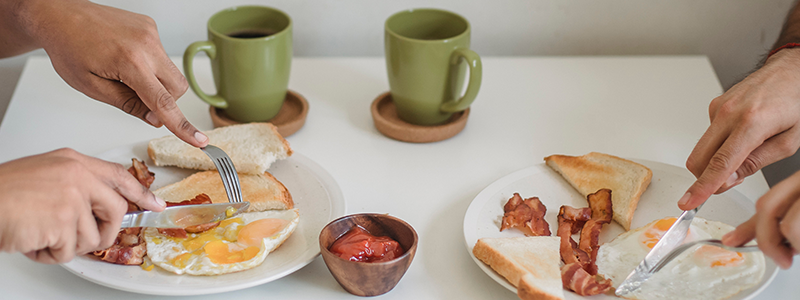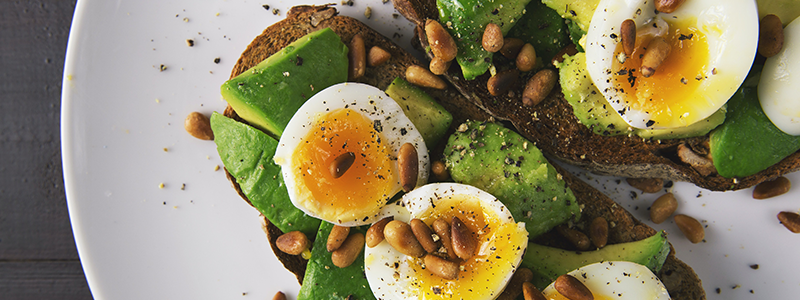Eggs are a delicious keto-friendly food you can prepare and enjoy in many different ways. You could try scrambled, fried, or baked in a tasty dish like a keto-friendly quiche. Eggs have been vilified in recent decades for their saturated fat and cholesterol content, but impressive science and research exonerates eggs and highlights them as a healthy, nutritious food. Eggs are a great choice for the ketogenic diet.
Eggs are an extremely healthy protein source.
Because each large egg contains less than 1 gram of carbs and about 6 grams of protein, eggs can be ideal for keto.
In addition, eggs have been shown to trigger hormones that increase feelings of fullness.
It’s important to eat whole eggs rather than egg whites since most of an egg’s nutrients are found in the yolk. This includes the antioxidants lutein and zeaxanthin, which protect eye health.
Although egg yolks are high in cholesterol, they don’t appear to increase your risk of heart disease.

How Many Eggs a Day on a Keto Diet?
There is no upper limit. A healthy person can eat eggs every day. In the US there is no longer a recommended upper limit on daily cholesterol intake and they removed the limit of 35% on dietary fat.

Should I Eat Egg Whites Only?
Not! WHOLE eggs are one of the most nutritious foods on earth! And MOST of the nutrients are in the egg yolk.
Instead of selling cartons of egg whites in the store, they should be selling the egg yolks too. Sadly it’s leftover bad information about the fat in the yolk even though 2/3 of the fat is the good Omega 3 type of unsaturated fat. And for Keto that is what we want!
Another thing, if you feel you are allergic or sensitive to eggs, there’s a good chance it’s the whites and not the yolks, so give that a try and see.

How To Consume Eggs On A Keto Diet:
- Whole eggs — egg yolks and egg whites are the main sources of fat and protein. If anyone is allergic to any of these, they can refrain from eating the egg yolk.
- One must consume 1 tablespoon (15 grams) of butter or healthy fat per egg consumed to balance the diet.
- One must eat a whole egg within 30 minutes of waking up to keep the metabolism balanced.
- One must eat an egg-based meal every three to five hours to avoid indigestion or constipation.
- One must eat a meal even if they are not hungry to keep the egg count ticking.
- One can eat up to 1 ounce (28 grams) of full-fat cheese per egg consumed.
- One can/must eat at least six whole eggs per day.
- Eggs should be local, pastured eggs whenever possible.
- One should stop eating three hours before bedtime irrespective of the diet.

What about the Cholesterol in Eggs?
Eggs improve your cholesterol profile and there is no scientific evidence that they will increase your risk of heart disease.
Those old theories have long been debunked.
Your liver produces cholesterol BECAUSE YOU NEED IT! When you eat cholesterol in food, your liver produces less.
Can You Lose Weight Eating Eggs on Keto?
The answer is a big fat yes!
As of the time of writing this (April 2021), I am down 123 lbs and I eat eggs daily. Eggs are one of the best Keto foods in my opinion and should be a part of any healthy diet.
I’ve also done the Keto Egg Fast many many times and have helped to create most of the Egg Fast recipes that are out there!
Not only is the Egg Fast a great tool for breaking a keto weight loss plateau, some people do an egg fast to make their grocery dollars stretch to the end of the month because it’s a cheap way to eat.
To learn more about the Egg Fast, start here with my Egg Fast guides and I’ll list some keto egg recipes below!
So as the TV commercial says ‘Get Crackin!’ Try out this perfect keto food, the humble egg.

The Bottom Line
We wish you all the best on your keto journey. The best way to succeed on a Keto diet is to have a proper understanding of the dos and don’t of a Keto diet and by knowing the best Keto-Friendly foods. Now that you know that eggs are the staple Keto food, don’t forget to buy a lot of eggs to keep the Keto diet going, however, don’t overeat as well.




